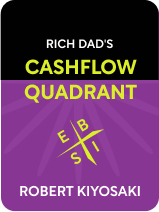

This article is an excerpt from the Shortform book guide to "Rich Dad's Cashflow Quadrant" by Robert T. Kiyosaki. Shortform has the world's best summaries and analyses of books you should be reading.
Like this article? Sign up for a free trial here .
As you advance in your career, do you have less free time or more free time? What would you do with more free time?
American investor and financial educator Robert Kiyosaki has been both rich and poor. Rich is better, he says, because money is freedom—the more money you have, the freer you are to pursue life on your own terms.
Here is what Kiyosaki has to say on money being a means to an end—the end being freedom, and why you shouldn’t feel guilty about wanting more money.
Money Is Time
It goes without saying how more wealth equals more time and greater resources. The more money you have, the less time you have to spend working for it. And the more money you have, the more money you have to spend doing what it is you want to do. To Kiyosaki, being able to spend all your time doing exactly what you want is freedom.
One of the key differences between Kiyosaki’s “Rich Dad” and “Poor Dad” is in the relationship between their career trajectories and the amount of free time they had. As Rich Dad, a businessman and investor, excelled in his career, he had more and more time to spend with his family and on his passions. As Poor Dad, actually an upper-middle-class public education official in the E and S categories, excelled in his career, he had to work harder and longer hours, because he was given more work and responsibility.
In summary, the harder Poor Dad worked, the poorer he was in time. The harder Rich Dad worked, the more free time he gained.
(Shortform note: Other authors offer different reasons to try to attain wealth. In contrast to Kiyosaki’s emphasis on the free time wealth brings, Ramit Sethi, who we’ll continue to reference throughout this guide, explains his concept of a “rich life” in his book I Will Teach You To Be Rich. A “rich life” emphasizes the specific reasons you want to reach your financial goals—what particular things you could do with more money that would create a life that is fulfilling to you.)
Money Is Freedom
Freedom to spend your time the way you want isn’t the only type of freedom wealth brings. According to Kiyosaki, the ultimate goal of building wealth is a step further—financial freedom. To Kiyosaki, financial freedom means never having to work again. The financially free can do nearly whatever they want, whenever they want because money is almost never an obstacle.
While Kiyosaki focuses on how to achieve 1-percenter, capitalist-level financial freedom, where all your time is yours and almost nothing is out of reach, he says the principles he puts forward are equally useful for reaching financial security. Even if you’re not willing to commit yourself to the risks and lifestyle it takes to achieve financial freedom, Kiyosaki thinks that, at minimum, you should strive for a life where concerns about money don’t dictate the way you live.
Ultimately, Kiyosaki wants you to transcend job security, where your life is defined by the dollar amount on your paycheck and the parameters of your day-to-day work. To Kiyosaki, if all you have is job security, all you have is job dependency.
It’s Good to Want Wealth
Kiyosaki says there’s no shame in wanting to be rich because money is freedom, and no one can be blamed for wanting freedom.
While Kiyosaki allows that our system has significant flaws that create inequality, he says it’s easier to beat the system by generating wealth than it is to change the system to make it fairer. There are many reasons Kiyosaki thinks ethical wealth accumulation is actually good:
- Kiyosaki says there’s nothing particularly moral about being beholden to a job you hate, lack of funds, or debt.
- Because learning to generate wealth requires delayed gratification and living below your means, trying to become rich will teach you financial self-control.
- In fact, he says that by not striving at least for financial security, you set a bad example for your kids, who will inherit your attitude toward money.
- Kiyosaki argues that generating massive amounts of wealth is actually generous.

———End of Preview———
Like what you just read? Read the rest of the world's best book summary and analysis of Robert T. Kiyosaki's "Rich Dad's Cashflow Quadrant" at Shortform .
Here's what you'll find in our full Rich Dad's Cashflow Quadrant summary :
- Why the traditional path of college to career doesn't work
- Which types of income will lead you to financial freedom
- An in-depth look at Robert Kiyosaki's four cashflow quadrants






